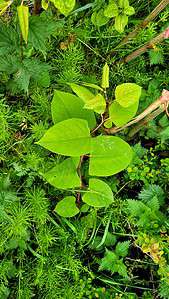The Impact of Japanese Knotweed on Property Insurance in the UK
Japanese Knotweed is a notorious plant that can cause significant property damage.
In this article, we are leading to increased insurance premiums and potential issues with mortgage lenders. We’ll explore the impact of Japanese Knotweed on property insurance in the UK, including how to identify it and what steps you can take to manage it.
Japanese Knotweed is an invasive plant species native to Asia but has spread to many other countries, including the UK. It can grow up to 3-4 meters tall and spread rapidly, seriously threatening natural habitats, wildlife, and buildings. Japanese Knotweed is notorious for its destructive impact on property, leading to increased insurance premiums and potential issues with mortgage lenders. In this article, we’ll explore the effects of Japanese Knotweed on property insurance in the UK, including how to identify it and what steps you can take to manage it.
What is Japanese Knotweed?
Japanese Knotweed is an herbaceous perennial plant that grows from a rhizome, an underground stem that can produce new plants. It has bamboo-like stems that can grow up to 3-4 meters tall and broad green leaves that can grow up to 14cm long. Japanese Knotweed produces small, cream-coloured flower clusters in late summer and early autumn.

Japanese Knotweed
Why is Japanese Knotweed a problem?
Japanese Knotweed is a problem because it can cause significant damage to property, particularly buildings and infrastructure. The plant’s roots can grow up to 3 meters deep and extend up to 7 meters horizontally, causing damage to foundations, walls, and pipes. This can lead to costly repairs and, in severe cases, render the property uninhabitable.
Japanese Knotweed is also a problem for mortgage lenders because it can affect the property’s value and make it more difficult to sell. If Japanese knotweed is suspected on the property, lenders may require a specialist survey, and some may refuse to lend altogether.
How to Identify Japanese Knotweed?
Japanese Knotweed is relatively easy to identify, particularly during the summer when it is in full bloom. Look out for the following characteristics:
- Bamboo-like stems that are green, smooth, and hollow
- Broad green leaves that are shaped like a shield and have a pointed tip
- Clusters of small, cream-coloured flowers in late summer and early autumn
- Rhizomes that are brown, woody, and resemble bamboo canes
If you suspect Japanese Knotweed on your property, acting quickly and seeking professional advice is essential.
The Impact of Japanese Knotweed on Property Insurance in the UK:
Japanese Knotweed can significantly impact property insurance in the UK. The presence of Japanese Knotweed can lead to increased insurance premiums, as insurers see it as a potential risk that may lead to costly repairs. In some cases, insurers may refuse to cover properties affected by Japanese Knotweed, making it difficult for homeowners to obtain insurance coverage.
Mortgage lenders are also concerned about the impact of Japanese knotweed on property values and may refuse to lend to affected properties. This can make it challenging for homeowners to sell their property or remortgage, potentially leaving them financially tricky.
Managing Japanese Knotweed:
Managing Japanese Knotweed is essential to minimise its impact on property and insurance in the UK. Here are some tips on how to manage Japanese Knotweed:
- Don’t attempt to remove Japanese Knotweed yourself, as this can cause it to spread. Seek professional advice from a qualified specialist.
- Consider herbicide treatment, the most effective way to control Japanese Knotweed. Specialist companies can conduct treatment programs tailored to your property and its location.
- Monitor the area for regrowth and treat any new shoots promptly to prevent the plant from spreading.
- If you’re buying a property, ensure a specialist survey is carried out to identify any Japanese Knotweed on the land. Moreover, this can help you negotiate with the seller or avoid purchasing a property that may be affected.
- If you’re selling a property, consider conducting a survey beforehand and addressing any Japanese Knotweed issues before putting the property on the market. This can help you sell the property more efficiently and avoid problems with buyers and mortgage lenders.
FAQs:
Q: Is Japanese Knotweed illegal in the UK? A: Japanese Knotweed is not illegal in the UK. Moreover, it is a controlled plant under the Wildlife and Countryside Act 1981. It is an offence to plant or cause Japanese Knotweed to grow in the wild. Additionally, homeowners have a responsibility to control it on their property.
Q: Can I remove Japanese Knotweed myself? A: It’s not recommended to do so, as this can spread the weed. Seek professional advice from a qualified specialist who can carry out effective treatment.
Q: How long does it take to treat Japanese Knotweed? A: The time it takes to treat Japanese Knotweed depends on the severity of the infestation and the treatment method used. It can take several years to eradicate Japanese Knotweed.
Japanese Knotweed can have a significant impact on property insurance in the UK. You are leading to increased premiums and potential issues with mortgage lenders. Moreover, It’s essential to identify and manage Japanese Knotweed promptly to minimise its impact on your property and finances. Additionally, seek professional advice from a qualified specialist and consider herbicide treatment to control the plant effectively. Suppose you’re buying or selling a property. Ensure that a specialist survey is carried out. To identify any Japanese Knotweed issues and address them before making any transactions. By taking proactive steps. You can protect your property and finances from the impact of Japanese Knotweed.
